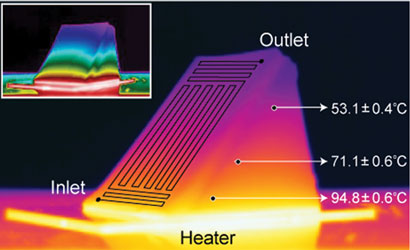
A height-dependent linear temperature gradient established on the inclined surface of a 3D qiandu (right triangular prism)-shaped PDMS microdevice enables flow-through PCR employing a single heater
South Korean scientists have created a temperature cycle for the on-chip flow-through polymerase chain reaction (PCR) using a single heater.
PCR is used to make copies of a piece of DNA for genetic research, disease analysis and diagnosis. It consists of four main steps – initialisation; denaturation (melting the DNA template to yield single-stranded DNA); annealing primers to the single-stranded DNA template; and extension, in which the DNA polymerase synthesises a new DNA strand complementary to the DNA template.
On-chip flow-through PCR typically has a short reaction time due to rapid thermal equilibrium allowing quick temperature transitions; however, it normally requires several separate heating blocks to create the different temperatures. Reducing the number of heaters will help make the whole system smaller and more portable. ‘Analysing samples on site could help prevent degradation and contamination,’ explains Nae Yoon Lee from Gachon University, South Korea, who led the research.
Read the full story here in Chemistry World.
Link to journal article:
Flow-through PCR on a 3D qiandu-shaped polydimethylsiloxane (PDMS) microdevice employing a single heater: toward microscale multiplex PCR
Wenming Wu, Kieu The Loan Trinh and Nae Yoon Lee
Analyst, 2012, Advance Article
DOI: 10.1039/C2AN35077G










